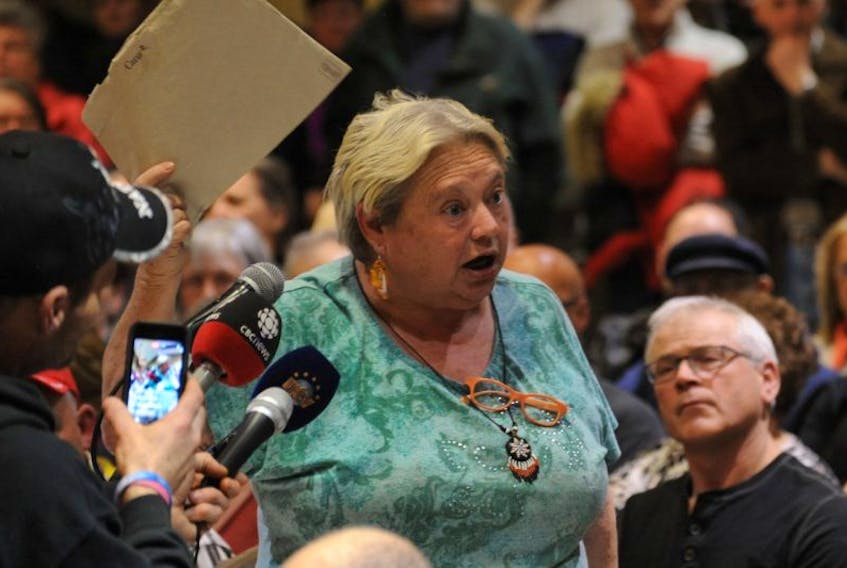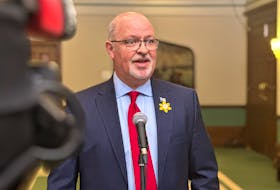The assembly was formed to support those who, as expected, have been denied enrolment in the Qalipu Mi’kmaq First Nation Band, but does welcome those who have been accepted also.
While Qalipu has been holding its own public sessions to discuss the issues with the Mi’kmaq community, more than 300 people came out for the assembly’s turn to host.
Lorraine Stone, one of the first people to speak when the floor was opened to the audience, urged people not to be too harsh on Qalipu Chief Brendan Mitchell and his council.
“He didn’t do these forms,” she said of Mitchell as she held some of her family’s application paperwork. “There’s people up there in Winnipeg who don’t have a clue, apparently.”
As Mitchell himself stated during his opening remarks, Stone said their fight has to be directed against the federal government and not at themselves.
“Let’s get together,” said Stone, who has been granted membership in Qalipu. “We’re Mi’kmaq … let’s stand together and show the government, you might want to divide us, but we are not going to be divided.”
Kenny (Muchie) Bennett, a well-known Mi’kmaq cultural leader from Stephenville Crossing, expressed his disappointment that so much of this has been made to be more about accessing benefits or showing how much someone participates in an indigenous lifestyle.
“My heart is broke over this,” said Bennett. “Here we are fighting over this. This is about ancestry.”
Bennett said the criteria for membership should simply be whether or not one’s bloodline can be traced back to those who identified as Mi’kmaq in the 1945 census.
“Why should it be anything else? Fight for that, chief,” he implored to Mitchell, who will be meeting with federal government representatives in Ottawa today.
Another well-known Mi’kmaq leader from the Bay St. George area, Hayward Young, also took the microphone. The former Indian Head Band chief said he has documentation that shows the Federation of Newfoundland Indians should have been able to bring the supplemental agreement to its full membership for a vote.
The supplemental agreement was signed in 2013 by the Federation of Newfoundland Indians, which by that time consisted of only Qalipu council members and no one else. That’s because the federation had agreed in October 2009 that only the Qalipu council would make up the federation until the Qalipu band was established.
Young said the federation had four options and had legal advice in the spring of 2009 that advised it to ask its full membership how they wanted the federation to proceed.
Those options, he said, included keeping the status quo, dissolving the federation altogether, maintaining the federation solely for the purpose of fulfilling its future obligations, or mending the federation’s membership criteria to solely include the Qalipu membership.
“I can’t remember anyone coming to me and giving these four options,” said Young, who got no affirmative answers when he asked the crowd if anyone else had been asked about these options.
Young said he voted against the original agreement-in-principle to form Qalipu because he didn’t think it was a good deal. Still, he accepted the fact the majority of the membership had voted in favour of it democratically.
“This supplemental agreement was not democratic,” he said.
The assembly was formed to support those who, as expected, have been denied enrolment in the Qalipu Mi’kmaq First Nation Band, but does welcome those who have been accepted also.
While Qalipu has been holding its own public sessions to discuss the issues with the Mi’kmaq community, more than 300 people came out for the assembly’s turn to host.
Lorraine Stone, one of the first people to speak when the floor was opened to the audience, urged people not to be too harsh on Qalipu Chief Brendan Mitchell and his council.
“He didn’t do these forms,” she said of Mitchell as she held some of her family’s application paperwork. “There’s people up there in Winnipeg who don’t have a clue, apparently.”
As Mitchell himself stated during his opening remarks, Stone said their fight has to be directed against the federal government and not at themselves.
“Let’s get together,” said Stone, who has been granted membership in Qalipu. “We’re Mi’kmaq … let’s stand together and show the government, you might want to divide us, but we are not going to be divided.”
Kenny (Muchie) Bennett, a well-known Mi’kmaq cultural leader from Stephenville Crossing, expressed his disappointment that so much of this has been made to be more about accessing benefits or showing how much someone participates in an indigenous lifestyle.
“My heart is broke over this,” said Bennett. “Here we are fighting over this. This is about ancestry.”
Bennett said the criteria for membership should simply be whether or not one’s bloodline can be traced back to those who identified as Mi’kmaq in the 1945 census.
“Why should it be anything else? Fight for that, chief,” he implored to Mitchell, who will be meeting with federal government representatives in Ottawa today.
Another well-known Mi’kmaq leader from the Bay St. George area, Hayward Young, also took the microphone. The former Indian Head Band chief said he has documentation that shows the Federation of Newfoundland Indians should have been able to bring the supplemental agreement to its full membership for a vote.
The supplemental agreement was signed in 2013 by the Federation of Newfoundland Indians, which by that time consisted of only Qalipu council members and no one else. That’s because the federation had agreed in October 2009 that only the Qalipu council would make up the federation until the Qalipu band was established.
Young said the federation had four options and had legal advice in the spring of 2009 that advised it to ask its full membership how they wanted the federation to proceed.
Those options, he said, included keeping the status quo, dissolving the federation altogether, maintaining the federation solely for the purpose of fulfilling its future obligations, or mending the federation’s membership criteria to solely include the Qalipu membership.
“I can’t remember anyone coming to me and giving these four options,” said Young, who got no affirmative answers when he asked the crowd if anyone else had been asked about these options.
Young said he voted against the original agreement-in-principle to form Qalipu because he didn’t think it was a good deal. Still, he accepted the fact the majority of the membership had voted in favour of it democratically.
“This supplemental agreement was not democratic,” he said.










